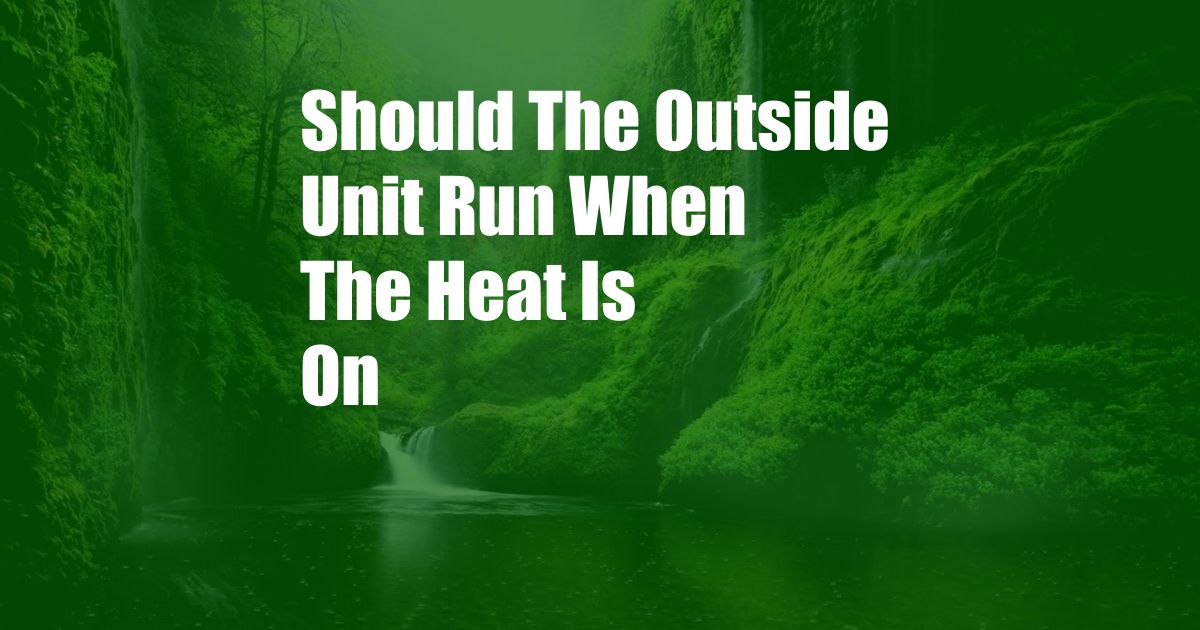
Should the Outside Unit Run When the Heat Is On?
As the weather outside turns frigid, you may wonder if your outdoor AC unit needs to run. You’d think it’s time for a break, but sometimes, it’s quite the opposite. So, should the outside unit run when the heat is on? The answer can be a bit nuanced, but we’ll dive into the details so you can make an informed decision for your home comfort system.
When the Outside Unit Needs to Run
Heat Pump Systems
If you have a heat pump system, the outside unit is an essential component in providing both heating and cooling for your home. During the winter months, your heat pump will extract heat from the outdoor air and transfer it inside, effectively warming your home. However, as the outdoor temperature drops significantly below freezing, the efficiency of heat pumps diminishes. At this point, your system may rely on auxiliary heating sources, such as an electric resistance heater, to supplement the heat pump’s output.
Defrost Cycle
Even when it’s cold, your outdoor unit may still need to run periodically to defrost the coils. When the outdoor temperature is below freezing, moisture in the air can freeze on the coils, forming ice that can block airflow and reduce the system’s efficiency. To prevent this, the outdoor unit will occasionally run in defrost mode to melt any accumulated ice. This process helps maintain optimal performance and prevents damage to the system.
When the Outside Unit Doesn’t Need to Run
Conventional Furnaces
If you have a conventional furnace, the outside unit for your air conditioner is not typically required to run during the heating season. Furnaces generate heat within the home using fuel sources like gas or oil, and they do not rely on an outdoor unit to function. Therefore, the outdoor AC unit can remain off during the cooler months.
Tips and Expert Advice
Monitor Outdoor Temperature
Keep an eye on the outdoor temperature. If it consistently falls below freezing (32°F or 0°C), it’s generally advisable to turn off the outdoor unit for AC systems. However, if you have a heat pump system, it should remain on to operate efficiently and provide heating.
Check for Frost
Periodically inspect your outdoor unit for signs of frost or ice accumulation on the coils. If you notice any frost, it indicates that the system is struggling to defrost effectively. This may require professional servicing to ensure optimal performance and prevent damage.
FAQs
Q: Can I damage my AC unit by running it in the winter?
A: No, running the outdoor unit during cold weather will not damage the system as long as it is functioning correctly. It may need to run intermittently for defrost purposes, and it can still operate efficiently in low temperatures.
Q: Why does my AC unit run for a short time and then turn off in the winter?
A: This is likely the defrost cycle. The system is attempting to melt any accumulated ice on the coils, and it will turn off once the ice is removed.
Q: Should I cover my outdoor AC unit in the winter?
A: It’s not recommended to cover your outdoor AC unit in the winter. Covering it can trap moisture and debris, potentially causing damage to the system. Instead, keep it clear of snow and debris.
Conclusion
Determining whether to run the outside unit of your AC system during the heating season depends on the type of system you have and the outdoor temperature. If you have a heat pump, it should continue to run to provide heat. If you have a conventional furnace, the outdoor unit can typically be turned off. By following these guidelines and tips, you can ensure your home comfort system operates efficiently and effectively throughout the year.
Are you interested in learning more about heating and cooling systems for your home? Explore our website for additional information, tips, and advice to optimize your indoor comfort.